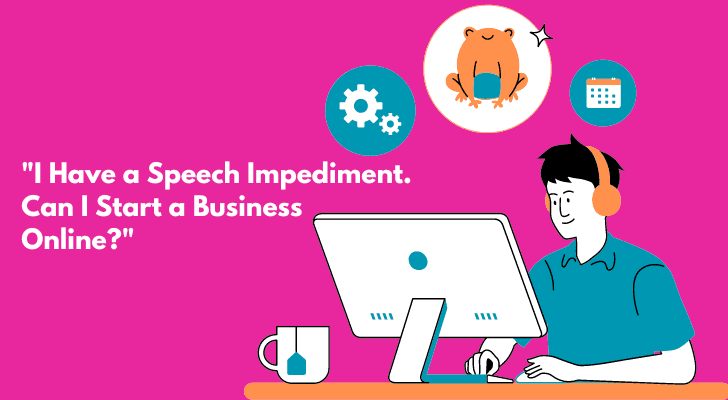Are you considering starting a business but feel like your speech impediment is holding you back? But you know that there are plenty of methods online without relying on verbal discussions or meetings.
Examples include using email marketing campaigns, automated chatbots, and social media platforms that allow customers to interact with your brand in real time. There are plenty of tools available to help you succeed in the world of online entrepreneurship. So here are the methods and how you can overcome your own challenges with self-expression. Get ready to find your voice!

Understanding Speech impediment and the Types
In case you know someone with a speech impediment and you’re looking to understand it a little - it can be caused by various factors, including neurological conditions, physical impairments, developmental disorders, or injuries. Here are some common types:
- Articulation Disorders: These involve difficulties in forming or producing specific speech sounds accurately. Examples include substituting one sound for another ("wabbit" instead of "rabbit") or omitting certain sounds.
- Fluency Disorders: These affect the flow and rhythm of speech. Stuttering is a well-known fluency disorder characterized by repetitions, prolongations, or blocks in speech.
- Voice Disorders: These impact the quality, pitch, or volume of the voice. Disorders such as vocal nodules, vocal cord paralysis, or laryngitis can cause hoarseness, breathiness, or a strained voice.
- Apraxia of Speech: This neurological condition affects the motor planning and coordination of speech movements. Individuals with apraxia may struggle to coordinate the precise muscle movements needed for speech production.
- Dysarthria: This condition results from muscle weakness, paralysis, or coordination difficulties affecting the muscles used for speech. It can lead to slurred speech, imprecise articulation, or changes in voice quality.
Start a Business From Home? No Problem!
If you have difficulties in verbal communication, running a business online perfectly makes sense. You probably know how it can be advantageous already, such as…
Reduced reliance on spoken communication
In traditional brick-and-mortar businesses, verbal communication plays a significant role in interactions with customers, clients, and colleagues. Whereas online businesses rely more on written communication, minimizing the impact of speech impediments. Emails, chat messages, social media posts, and website content… The ability to express yourself through writing can level the playing field.
You can engage with others without facing the same barriers you might encounter in face-to-face interactions. It means that you can articulate your thoughts, ideas, and instructions in the way you want, ensuring clear and concise communication.
Accessibility
The Internet provides an accessible environment where you can participate in business activities on an equal footing. You can leverage assistive technologies, such as speech-to-text or text-to-speech software, to facilitate communication.
Additionally, any digital content can be optimized and made accessible to users with disabilities, ensuring inclusivity for a broader audience.
Flexibility and independence

Online businesses often offer flexibility in terms of working hours and location. This can be beneficial if you require additional time or accommodations.
You can set your own schedules, work from home or a preferred environment, and adapt your workflow to accommodate your unique needs. This flexibility can enhance productivity and overall work-life balance.
Global reach and market access
Obviously, online businesses have the potential to reach a global audience. This expanded reach allows you to tap into diverse markets, find your niche audience, and showcase your expertise on a larger scale.
An online business allows you to leverage your strengths and overcome some of the challenges you might face in traditional business settings.
The internet provides a platform for inclusive entrepreneurship, enabling you to thrive based on your abilities and the value you bring to your chosen fields.
The Challenges?
With that said, some circumstances require verbal communication in which you may feel uncomfortable. Here are some of the challenges they may encounter:
Verbal communication limitations
You may face difficulties in verbal communication during video conferences, phone calls, or podcast interviews. Your speech impediment can affect your ability to express yourself verbally, requiring you to find alternative means of communication or rely on written communication.
Building rapport and networking
Building relationships and networking can be challenging for you in an online business setting. Verbal communication plays a significant role in establishing rapport, and not being able to communicate fluently can hinder the development of personal connections. You may need to find alternative ways to connect and build relationships, such as through written communication or leveraging assistive technologies.
Misinterpretation and bias
There is a risk of misinterpretation or bias when relying primarily on written communication. Without the ability to convey a tone of voice or non-verbal cues, messages can be misunderstood or perceived differently. You may need to put additional effort into ensuring clarity and avoiding misunderstandings in your written communication.
Public speaking challenges
There may still be instances where public speaking is required. This can include webinars, online presentations, or speaking engagements. You may face challenges in delivering these presentations verbally and may need to explore alternative methods, such as using visual aids, pre-recorded presentations, or partnering with someone who can assist with the verbal aspects.
Customer perception and trust
Perception from potential customers or clients can be a challenge for you. Some people may associate speech impairments with limitations or misunderstand your abilities. It may require extra effort to build trust, demonstrate expertise, and showcase the value you bring to your online business.
Overcome or Avoid?
You’ve struggled with your speech problem all your life, so you know what it takes to overcome it. You can only try your best to improve your ability, or avoid such circumstances - tell others that you’re not participating in such events. The solutions are;
Proper planning
You can take steps such as:
- Identifying communication-sensitive scenarios: Recognize situations where verbal communication is crucial for your online business, such as client meetings, negotiations, or public speaking engagements.
- Preparation and practice: Dedicate time to prepare for these communication-sensitive scenarios. Practice your speech, anticipate potential challenges, and develop strategies to address them. Consider working with a speech therapist or communication coach to enhance your verbal communication skills.
- Leveraging visual aids: Utilize visual aids and multimedia resources to support your verbal communication. Create compelling slide decks, infographics, or videos that enhance the delivery of your message and help convey information effectively.
- Seeking support: Connect with support networks, such as communities or groups of individuals with similar experiences, who can provide guidance, share strategies, and offer encouragement.
- Flexibility and adaptation: Be open to adapting your communication approach when necessary. This may involve using alternative methods, such as written communication or assistive technologies, in situations where verbal communication is challenging.
Leverage technology
Take advantage of communication tools that support your needs, such as video conferencing platforms with closed captioning or instant messaging features.
Use speech recognition software to assist with verbal communication, or explore video editing tools to create pre-recorded presentations where you have more control over your speech delivery.
Avoid it - embracing your unique strengths
Or you can decline invitations to events where verbal communication are required. Just tell them that you have a speech problem.
Instead, recognize and embrace your unique strengths and expertise. Focus on showcasing your skills, knowledge, and the value you bring to your online business. Highlight your accomplishments through well-crafted written content, testimonials, case studies, or visual materials.
By emphasizing your expertise and the quality of your work, you can build trust, and credibility, and overcome potential biases or misconceptions.
Tools to Help Those with Speech Impediments
There are several tools and technologies available to assist people with speech impediments in improving their communication abilities. Here are some examples:

#1 Augmentative and Alternative Communication (AAC) Devices
AAC devices are designed to support your communication needs and provide alternative methods for expressing yourself. The specific device you choose will depend on your preferences and abilities. Working with a speech-language pathologist or AAC specialist can help you identify the most suitable AAC device and provide training on its use. The types of devices are;
- Communication Boards: These are physical or digital boards that contain symbols, pictures, or words representing various communication options. You can point to or select the symbols on the board to convey your message.
- Speech-Generating Devices: These are electronic devices with a screen or buttons that display symbols or text. By selecting the symbols or typing out messages, the device generates spoken words or phrases, allowing you to communicate.
- Tablet/Smartphone Apps: There are numerous AAC apps available for tablets or smartphones. These apps provide a range of features, including symbol-based communication grids, text-to-speech capabilities, and customizable communication boards, all accessible on a portable device.
- Eye Gaze Systems: Eye gaze technology tracks your eye movements and allows you to select symbols or words on a screen by focusing your gaze. This enables you to communicate without the need for physical interaction or speech.
- Portable Voice Amplifiers: These small devices amplify your voice, making it louder and clearer. They can be particularly useful in situations where your speech might not be audible enough, such as in crowded environments or during public speaking.
#2 Text-to-Speech (TTS) Systems
Text-to-Speech systems are technologies that can convert written text into spoken words. Here are some elaborations on TTS systems:
- Applications: TTS systems are available as applications for computers, smartphones, and tablets. These applications can read aloud digital text from various sources such as documents, emails, web pages, or e-books.
- Accessibility Features: Many operating systems and devices have built-in TTS capabilities. These accessibility features allow you to select text on your screen and have it read aloud to you.
- Customization: TTS systems often offer customization options for voice selection, speaking rate, and pronunciation. You can personalize the settings to match your preferences and optimize the listening experience.
- Multilingual Support: TTS systems support multiple languages, allowing you to listen to text in different languages or dialects.
- Integration with Assistive Technologies: TTS can be integrated with other assistive technologies, such as screen readers or communication devices, to enhance accessibility and communication for individuals with diverse needs.
TTS systems enable you to access and comprehend written information through auditory means. They can be beneficial in situations where reading text visually is challenging, or when you prefer to listen rather than read. TTS systems can assist you in consuming digital content, improving comprehension, and enhancing overall communication access.
#3 Visual Supports
Visual aids, such as visual schedules, communication charts, or symbol-based systems, can help people who have difficulties in speaking digest and express information. These visual supports provide a visual representation of concepts and facilitate comprehension and communication aid.
#4 Mobile Apps
Numerous mobile apps may include;
- AAC Apps: As explained above, they allow you to express yourself by selecting words, phrases, or symbols on the app, which is then converted into spoken language.
- Speech Therapy Apps: You can use these apps for interactive exercises, pronunciation guides, speech sound practice, and language-building activities. They can be used independently or alongside professional speech therapy sessions.
- Pronunciation and Articulation Apps: These apps help you improve your pronunciation and articulation skills. They often include audio recordings, visual guides, and interactive activities to practice specific sounds or words.
- Social Skills and Conversation Apps: They offer conversation prompts, visual cues, or scenarios to practice various social situations and enhance your communication skills.
#5 Telepractice Platforms
Telepractice platforms facilitate remote speech therapy sessions, allowing individuals to receive professional guidance and support from speech-language pathologists (SLPs) through video calls. This can be particularly useful for individuals in remote areas or those with limited access to local speech therapy services.
Business Models That Don’t Require You To Talk
Various online business models can operate successfully without relying heavily on verbal communication. Here are a few examples:
- Blogging (written content and engagement through comments)
- Affiliate marketing (written content and promotions)
- Social media management and consulting (written content and engagement)
- Graphic design services (communication through emails and messaging)
- Print-on-demand (written communication for order processing and customer support)
- Virtual assistant services (written communication for task coordination)
- SEO consulting and services (written communication for analysis and recommendations)
- Other content creation (written content, such as e-books, photography, or artwork)
- Email marketing services (written content and communication through email campaigns)
- Software development (communication through project management tools and written documentation)
- Dropshipping (communication with suppliers and customers through written channels)
- Podcasting (communication through recorded audio content)
- Influencer Marketing (written content and visual media on social platforms)
- Translation Services (written communication for translation projects)
- Online Research and Data Analysis (written communication for research projects and deliverables)
My Customer Wants To Speak To Me. What Should I Say?
When faced with a customer who wants to speak with you on the phone but you are unable to do so due to your speech problem, here’s what you can do first of all;
- Express appreciation: Begin by thanking the customer for their interest in speaking with you and for reaching out to you directly.
- Acknowledge your limitations: Be open about your speech impediment and the challenges it presents when it comes to explaining things verbally. Assure the customer that it is not a reflection of their importance, but rather a personal difficulty you face.
If You’re Willing To Try
If you are still willing to speak with the customer, you can approach the situation with honesty and transparency.
- Offer alternative communication options: Tell the customer that while you are available to speak with them, you want to provide the best support possible. Suggest alternative methods of communication that you are more comfortable with and where you can provide clearer explanations, such as written communication via email or live chat.
- Emphasize your commitment to their satisfaction: Reiterate your dedication to addressing their concerns and providing excellent customer service. Assure the customer that by choosing an alternative communication method, you will be able to provide more comprehensive and accurate information.
- Provide instructions or contact details: Clearly outline the steps the customer should take to connect with you through the chosen alternative communication channel. Share your email address, provide a link to a live chat platform, or guide them to any other means of contact you suggest.
- Encourage questions and feedback: Invite the customer to ask any questions they may have and assure them that you are available to provide additional clarification or support as needed.
If You Want to Decline
Or, you can decline the request politely and professionally;
- Apologize and express regret: Show understanding and empathy towards the customer's desire to connect via phone. Apologize for any inconvenience caused and express your regret that you are unable to fulfill their request in that specific manner.
- Offer alternative communication channels: Suggest alternative means of communication that you are comfortable with and that will allow you to address the customer's needs effectively. This could include email, live chat, video calls, or utilizing a communication intermediary if necessary.
- Assure them of your commitment to assisting them: Reiterate your dedication to providing excellent customer service and assure the customer that you will do everything possible to address their concerns or queries through alternative communication channels.
- Provide contact details or instructions: Offer clear guidance on how the customer can reach you through the chosen alternative communication method. Provide any necessary contact details, links, or instructions to ensure a smooth transition to the preferred channel.
You Too Can Run a Successful Business From Home
Finding your voice online is a challenge for anyone, whether they have a problem in speaking or not. But plenty of tools are available, helping you find users that appreciates your unique point of view. So embrace your differences and use them as an advantage - you can make a lasting impact on those around you.
Keep seeking help from experts, building your network of support, and being confident in yourself and your abilities, you too can be successful running a business from home.

